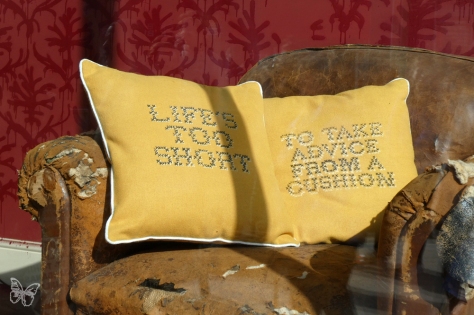
During the busy Frieze Art week 2019, elusive artist Banksy has opened a new pop up store overnight in Croydon, South London called Gross Domestic Product.
In a statement Banksy mentions it follows a legal dispute over Banksy’s trademark.
“[It is] possibly the least poetic reason to ever hold an art show,” Banksy says.

@Banksy
The homeware store – essentially a window display that will never actually open—is selling a range of items, from mugs, spray cans, prints, t-shirts to editions of the stab vest worn by the artist Stormzy at Glastonbury, welcome mats hand-stitched by women in detainment camps in Greece. The objects have all been installed in a series of window displays along with often-reproduced paintings such as Banksy’s Flower Thrower.




Prices start at £10, but the merchandise range will only be available to buy online after the shop shuts in two weeks. Until then, collectors will have to settle for window shopping. Proceeds from the merchandise will go to purchase a boat for the refugees to replace the one that was confiscated by Italian authorities.
Banksy says an unnamed greeting card company is contesting his trademark rights to his own name and imagery, “so they can legally use it to sell their fake Banksy merchandise”. He adds: “I think they’re banking on the idea I won’t show up in court to defend myself.”
Describing Banksy as “the most infringed artist alive”, DACS chairman and media lawyer Mark Stephens says: “What you have here is frankly ludicrous litigation, but the law clearly states that if the trademark holder is not using the mark then it should be handed to someone who will.” His solution? Create a merchandise range and open a shop.
Everything in the store “has been created specifically to fulfil a particular trademark category under EU law”, Banksy says. “I had the legal sheet pinned up in the studio like a muse.” He adds: “John Lennon said: ‘I’m an artist, give me a tuba and I’ll get something out of it.’ I feel the same way about a trademark dispute.”
“If Banksy wants to keep enforcing any of his trademarks in courts around the world, and avoid the risk of them being cancelled for lack of use, he will need to show judges stronger evidence of his brands being used in the market,” Enrico Bonadio, a senior lecturer in intellectual property law at City University of London, noted at the time. “This probably means he needs to start regularly producing and selling his own branded merchandise through a specialised commercial vehicle. The problem is that Banksy is a contradictory character. I wouldn’t be surprised if he started a proper business plan, while also continuing to send out his anti-consumerist message,” he says.

Banksy stresses that, despite trying to defend his rights in this particular case, he hasn’t changed his position on copyright. “I still encourage anyone to copy, borrow, steal and amend my art for amusement, academic research or activism. I just don’t want them to get sole custody of my name,” he says.










2 thoughts on “London: Banksy – Gross Domestic Product Installation”
Comments are closed.